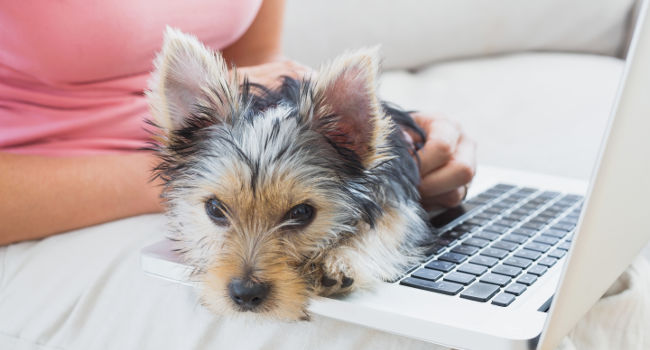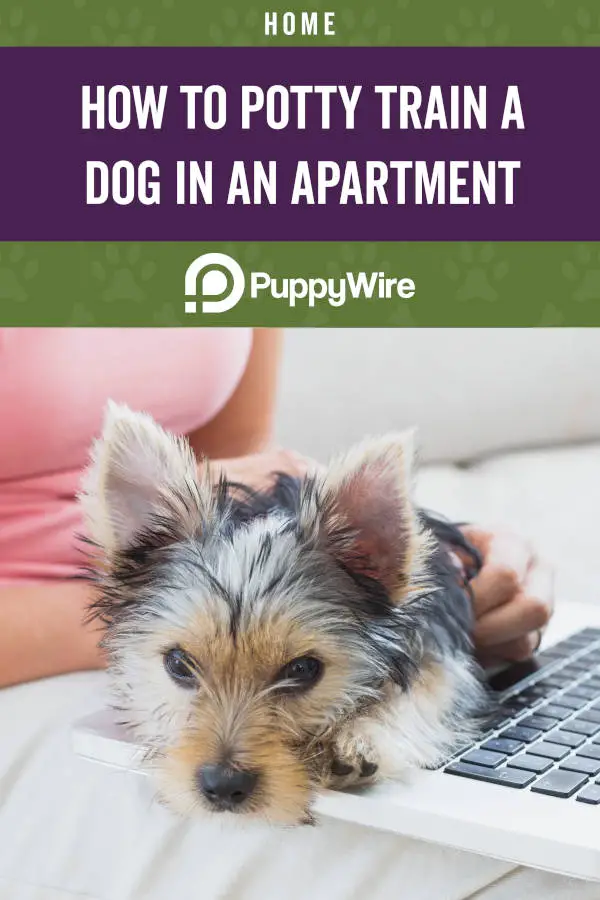How to Potty Train a Dog in an Apartment

Apartment living can present a few unique challenges when it comes to potty training, but you can potty train your puppy with a lot of patience and a little persistence. If you’re curious how to potty train a dog in an apartment, this one is just for you.
We’re going to give you several tips, tricks, and pieces of advice that can help your dog master the art of alerting you that they need to go outside and reduce accidents. Every puppy or dog is different, but the following tips can give you a solid foundation to build your potty training routine.
How Often Your Dog Has To Go Out
Younger puppies can’t hold their bladders as long as older dogs can, and you’ll start by taking your eight-week-old puppy outside every 20 to 30 minutes. This also includes during the night, so be prepared to get by on a little less sleep for the first few weeks.
As your dog gets older, they’ll be able to go longer time frames without going outside to go to the bathroom, but you should still plan to let them out at least four to five times a day. When your dog starts to approach senior territory, they won’t be able to hold it as well, and you’ll find yourself letting them outside more often.
Tips To Potty Train Your Dog in an Apartment
No matter how old your dog is, there are a few universal things you can do to help your dog understand that they can’t go to the bathroom in the house. They include but are not limited to:
Get in a Routine
The first thing you want to do is start feeding your dog on a routine schedule and take potty breaks at the same time every day. This routine can help your dog develop expectations and habits about when they’ll be able to go to the bathroom, and this can help avoid accidents.
If your dog is slightly older, take them outside every hour or two. When your dog wakes up or comes out of their crate, take them outside. After your dog eats, plays, or drinks a lot, take them outside roughly 5 to 10 minutes after and encourage them to go to the bathroom.
Watch for Signs Your Dog Has to Go Potty
Even young puppies will start to give subtle signals that they have to go outside and go to the bathroom. If you notice your dog starts to sniff around, circle, act restless, or go to a corner, take them outside because they’re most likely looking for a place to go to the bathroom.
Praise Good Behavior
Every time your dog successfully goes to the bathroom outside or in their designated potty area and not on your flooring, heap praise on them. Act excited and lavish them with attention or offer them a treat for their good behavior. Eventually, your dog will associate this praise with going outside to go to the bathroom.
Consider a Backup Plan
If you’re not around a lot and your dog isn’t in a crate, it’s a good idea to set up a backup plan so your dog can go to the bathroom if need be. It’s also a long way out the door, so it’s a good idea to use one of the following until you fully potty train your dog:
- Pee Pads – A pee pad usually has a scent that attracts your dog to it, and they have a waterproof coating on the bottom. You throw them away after your dog uses them and replace them with a new one.
- Indoor Dog Potty – An indoor dog potty is a tray of either real or synthetic grass with a waste catch tray on the bottom. Your dog goes to the bathroom, the pee trickles through, and you empty and wash out the tray to keep the area clean.
Carry Your Dog
If your dog is small and light enough, carry them until you get them outside where they can go to the bathroom. They’re less likely to have an accident with you holding them, and you can let them walk when you get more confident with their ability to hold it until they get outside.
Pick a Designated Area for Your Dog to Go to the Bathroom
Your dog uses scent and visual cues to understand when and where it’s okay for them to go to the bathroom. You can set up a designated potty area outside to encourage your dog to go and make sure you bring your dog to this area every time you bring them outside. This will encourage them to go when they’re outside.
Restrict Your Dog’s Area
Until you get your dog completely housebroken, it can be a good idea to restrict the areas they can and can’t go into inside the house. Baby gates are a great way to barricade doorways and restrict access. However, you shouldn’t isolate your puppy, and you want to keep up with your routine.
Crate Train Your Dog
If you can’t be home all day due to work, you should start crate training your dog as soon as you bring them home. This will help to keep your dog safe while you’re gone or asleep, and they usually won’t go to the potty in an area where they sleep. Make sure you let them out as soon as you get home and take them out to play.
Recruit Help
If you can’t get away from work to let your dog out during the day or night, recruit help. Ask a friend or family member to come over, let your dog out to go to the bathroom, and take them on a quick walk. You can also take advantage of dog walking services in your area.
What To Do If Your Dog Has An Accident in Your Apartment
Accidents can and will happen, and they happen to even the dogs that have potty training down to an art. If you notice your dog going to the bathroom indoors, pick them up, and carry them outside. You may also clap and say “no” loudly to startle your dog and get their attention.
Once you get your dog outside, set them in their potty area, and give whatever command you typically use when you bring them out. If they go, praise them for a few minutes before going back in and cleaning up the mess.
When you clean up your dog’s mess, you want to use an enzymatic cleaner because it contains bacteria that break down the urine odors and get rid of the smell. In turn, your dog won’t return to the area and go to the same place again.
Bottom Line
Training your puppy to go to the bathroom outside and not in your apartment takes time, patience, and a routine. You shouldn’t get angry or discouraged with your dog if they have accidents because they’re learning. Reward their good behavior, and they’ll eventually get completely housebroken.
